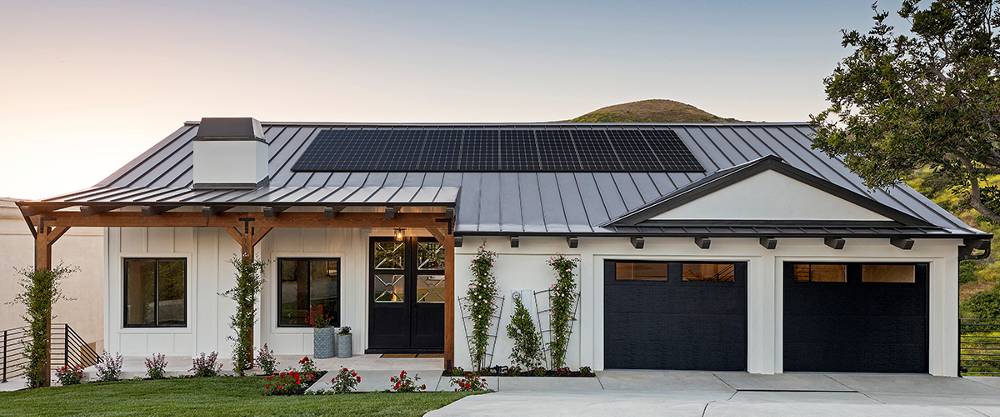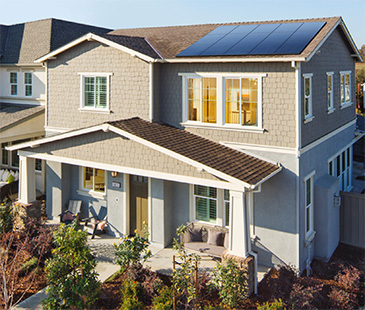Is It Better to Buy a Home With Solar or Install Solar Yourself?

As more and more homeowners look for ways to save money and reduce their carbon footprints, going solar is becoming an obvious choice. But when it comes to house shopping, you might be wondering what’s best: buying a home with solar panels already up and running on the roof or making this clean energy upgrade yourself. From cost and maintenance to customization and potential savings to personal preference and budget, there’s a lot to consider.
In this article, we’ll explore it all to help you make an informed decision about which option is best for the needs of you and your family.
The world is embracing renewable energy, and solar-powered homes are at the forefront of this transformation with the potential to save homeowners thousands per year on energy bills and make a positive environmental impact.
What to know before buying a house with solar panels
If you’re considering buying a house with solar panels already installed, there are some factors to consider:
Quality of the solar panels
If a house already has solar installed, assessing the panels’ quality and condition is essential. Ask the current homeowner about the age and condition, but don’t be afraid to have them checked yourself. Look for signs of damage or wear, including scratches and cracks.
You’ll also want to ask for detailed documentation, including the warranty, maintenance records, and solar installation date. Once you have this information, you should be able to determine the projected life expectancy of the panels. Though individual panel lifespans can vary, most can last for decades.
Ownership of solar panels
Understanding the ownership aspect of solar panels and the possible implications is crucial before purchasing a home with its own system.
Owning the panels gives you full control and the chance to make the most of the savings associated with solar energy. Leasing, meanwhile, gives you financial benefits of solar energy minus a monthly payment.
The good news is you can often get a mortgage for a house with solar panels. Many lenders recognize the value solar adds to a property, including energy savings and increased home value. Discuss your situation with your lender to find out whether they have policies in place for financing homes with solar installations.
Cost and savings potential of solar panels
Although solar panels can be great for saving money, every situation is unique. Here are some factors to consider when evaluating the savings potential of a solar home:
Local electricity costs
Average energy usage of the home
Solar panel output
Maintenance costs
Potential savings, based on factors like panel efficiency, peak sunlight hours, and tax breaks
Roof orientation and shading for solar panels
Some houses are better suited for solar panels than others. When considering the efficiency of solar power, take a look at the roof orientation. A south-facing roof receives the most sunlight in the Northern Hemisphere, while east and west-facing roofs may have slightly reduced energy production.
You should also check for shading from surrounding structures, like trees and neighboring buildings, as any shade cast on the solar panels can reduce their energy output.
Finally, check that the roof is in good condition, providing a secure foundation for the panels to maximize their lifespan.
Tax incentives and rebates for solar panels
Utilities and municipalities may offer incentives and financial rebates for homeowners to install solar panels. There may be federal tax credits or other incentives at the state level available to you as well.
It’s worth consulting with a tax professional for personalized advice about the tax rebates in your local area and how they apply to your specific tax situation.
Transferability of warranties for solar panels
Ask the homeowner about transferrable warranties, as some solar panel manufacturers allow the warranty to be transferred to subsequent owners, while others have limitations.
Ensure you understand the extent of the warranty coverage, terms and conditions, and manufacturer support available. Having this information can help you make a more informed decision.
What to know before installing solar panels on your house
Is it better to purchase a house without solar panels and install them yourself? Let’s take a look at the pros and cons:
Local regulations and permits for solar panels
Before deciding whether to install solar panels, familiarize yourself with local regulations. You may need building permits from your municipality.
Typically, local contractors can advise you about regulations in your area. They can also give you information about any panel design, size, and placement restrictions and even provide specific information about installing them on your house.
Homeowners association rules for solar panels
If the property you buy is part of a homeowners association (HOA), you need to check if there are any guidelines or restrictions for solar in the bylaws or covenants. Your HOA might have rules on the aesthetics and placement of solar panels to maintain the community’s visual appeal.
You may need to undergo an approval process with your HOA to install a new system, so you’ll want to do your research to determine the steps required and how long it could take.
Solar costs
Solar panels can be a significant investment, with the average cost between $15,000 and $25,000 for purchase and installation, according to NerdWallet. The total cost depends on various factors, including the size and type of panels, your property's location, and the installation process.
While the upfront cost is significant, installing solar panels can have long-term financial benefits. According to Forbes, households can save between $20,000 to $97,000 over the system's lifetime.
SunPower offers a number of financing options to help make solar more affordable, including $0 down financing for qualified customers. Solar leases, if available in your area, can be a great option too.
Types of solar panels
There are many types of solar panels available. The best kind to install depends on your needs and budget. The two main types are:
Monocrystalline: Made from a single crystal structure, known for high efficiency and sleek appearance.
Polycrystalline: Made from multiple crystal structures, known for being cost-effective and able to perform in low-light conditions.
Each type has pros and cons, and you’ll want to consider factors like style, efficiency, cost, and space. A professional solar installer can advise you on the best choice.
Quality of the solar panel
Not all solar panels are the same, and some are certainly better than others. Research the quality and reliability of the panels you need, including:
Manufacturer reputability
Warranty coverage
Certifications, such as those issued by the International Electrotechnical Commission (IEC)
Installer experience
Product reviews and testimonials
Maintenance
To keep your solar panels operating at peak efficiency, you may need to keep up with occasional maintenance. This can include:
Regular cleaning to remove dirt and debris
Periodic inspections to identify potential damage
Routine inspections by a professional
Monitoring energy production
Being proactive about keeping your panels clean and in top shape can help you enjoy the benefits of clean and renewable energy for longer.
Return on investment (ROI)
Calculating the potential ROI for installing solar panels means considering the upfront costs and maintenance in relation to energy savings.
You should also account for incentives like the Federal Investment Tax Credit (ITC), a 30% tax credit1 on the cost of purchasing solar panels, as well as for solar battery storage, which can also help offset the upfront investment.
Safety
Safety should be a top priority when installing solar panels, and we never recommend doing it yourself. Hiring a professional installer with experience installing solar systems is highly recommended to prevent injuries and damage to your home or solar components.
How to decide whether to buy a house with solar panels or install solar panels
Still stuck deciding between buying a house with solar panels or installing them yourself? Read on:
Factors to consider before going solar
Before you go solar, there are a few factors you should consider. First, determine whether the cost of the panels, installation fees, maintenance, and ROI are suited to your budget. Then, see if the energy output would suit your needs. Finally, check if your property is suited to solar panels and if you have the space.
Benefits of buying a house with solar power already installed
Buying a house with solar already installed can mean:
Immediate savings: You’ll have no wait for installation and permitting, so you can enjoy immediate savings on your electric bills from an existing solar panel system.
No upfront costs: With no system to purchase or install, you’ll avoid the upfront cost of going solar.
No hassle: While solar companies like SunPower work hard to make the process as painless as possible, by buying a home with solar already installed, you’ll skip the decision-making and scheduling that come with solar purchase and installation.
Environmental benefits: Help contribute to a greener future by reducing your carbon footprint.
Drawbacks of buying a house with solar power already installed
While buying a house with solar already installed has its benefits, it’s important to be aware of the potential drawbacks.
Higher house purchase price: The cost of a house with solar power already installed may be higher due to the added value of the solar system.
Limited customization: The existing solar panels might not align perfectly with your style or energy needs. For instance, if your family is bigger or if you have an EV, you’ll likely need more energy output than an existing system may provide.
Age and condition: If the home has an older system, the panels may no longer be as efficient or reliable.
Potential maintenance issues: Panels that have not been maintained properly could need to be replaced sooner than expected.
Warranty coverage & service support: Depending on the solar company and the conditions of the contract when the solar system was originally purchased, you, as a new owner of the home, may not have access to ongoing support or warranty coverage.
Benefits of installing solar panels
There are several benefits of installing solar panels:
Customization: You get the flexibility to customize the solar panels according to your family’s needs, energy requirements, and style.
Long-term savings: Enjoy substantial long-term savings on your electricity bills.
Higher energy output: By installing your own panels, you can select a model with an energy output that suits your needs and will benefit from the panels’ early life when efficiency is at its highest.
Tax credits and incentives: If qualified, you can take advantage of various tax credits and incentives2 available for installing solar panels, some of which may significantly offset the cost of going solar.
Increased home value: Installing solar panels can increase the value of your home, which means if you eventually sell, you’ll obtain a higher price.3
Drawbacks of installing solar panels
There are, of course, some potential drawbacks involved when installing solar panels. These may include:
Upfront costs: The initial costs can be high, including the cost of panels, inverters, installation labor, and other equipment.
Approval process: Getting your solar power system approved and turned on can be a lengthy process with certain steps dependent upon approval from your HOA, municipality and/or utility company.
ROI: While solar panels can provide long-term savings, recouping the initial investment can take several years.
Making a home solar power decision
Congratulations on taking a step toward a solar-powered future! A smart investment, solar power can make a real difference for your home and the planet.
Whether you buy a house with solar panels or install them in your home, remember that the choice will come down to your specific circumstances and preferences. Crucial considerations include costs, energy needs, property availability, and maintenance. These factors play a vital role in making an informed decision.
Ready to learn more about how you can power your home with clean, renewable solar energy?
SunPower is changing the way our world is powered by making solar and storage more accessible to everyone. With nearly 40 years of dedicated solar experience, we're the top-rated U.S. solar company with over 15,000 five-star reviews.*Based on public solar providers in the U.S. Includes average of BBB, Yelp, ConsumerAffairs, BestCompany, Google, Solar Reviews and Energy Sage review scores as of 7/1/23. Based on reviews from BBB, Yelp, ConsumerAffairs, BestCompany, Google, Solar Reviews and EnergySage review scores as of 10/22/23. If you're considering installing solar panels, energy storage, or EV charging at your home, make sure you talk to SunPower.
Schedule your free, no-obligation consultation with SunPower by calling 1-385-489-5552. Or click the Get Started button and we'll get in touch with you! Our team of Solar Advisors is here to help make your transition to a sustainable lifestyle.
FAQ - Is it better to buy a home with solar or install solar yourself?
Can I install solar panels myself, or do I need to hire a professional?
While it’s technically possible to install solar panels yourself, it’s highly recommended to hire a professional. Installation requires specialized knowledge, skills, and experience to ensure the proper placement and wiring. Professionals will also be familiar with local regulations and permitting processes and can help optimize the system for maximum efficiency and long-term performance.
Can I take my solar panels with me if I move to a new home?
While you may be able to take your solar panels with you when you move, it may not be the best option. You’ll first have to check whether the solar panels are owned or leased. With solar leases, you don’t have the freedom to relocate them. You also need to check if the panels are compatible with the new property before attempting to have them moved. Added costs will come into play if you de-install solar and then have it reinstalled at a different location. Expect to pay for things like removal, roof repair, transportation and handling costs, plus installation fees.
Disclaimers
1 Tax credits subject to change. SunPower does not warrant, guarantee or otherwise advise its customers about specific tax outcomes. Consult your tax advisor regarding the solar tax credit and how it applies to your specific circumstances.
2 Federal and state tax credits and local incentives vary and are subject to change. SunPower does not warrant, guarantee or otherwise advise its customers about specific tax outcomes. Consult your tax advisor regarding these solar tax credits and how they apply to your specific circumstances. You can also visit the dsireusa.org website for information on incentives available in your area.
3 Zillow, Homes with Solar Panels Sell for 4.1% More, a comparison of home values with and without solar, in New York, NY, Orlando, FL, San Francisco, CA, Los Angeles, CA and Riverside, CA. April 2019.

